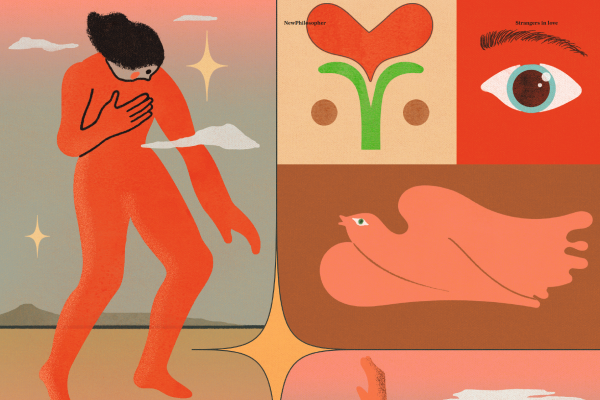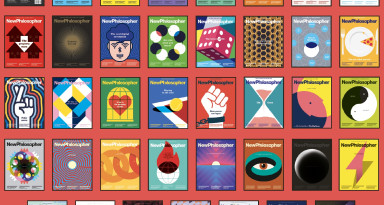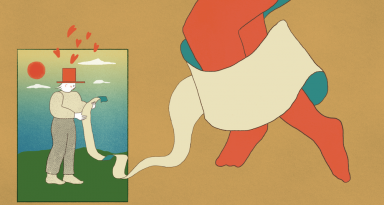When I spotted my husband, he was talking to a pre-schooler. My first thought was that we’d have to abort our little game: pretending I don’t know the man I live with is one thing; doing it in front of an audience is ludicrous. I resented him for making the game harder, but I was also proud of him. After all, it was I who had suggested we play strangers for the weekend in a foreign city while his parents watched our kids back home. It was well within his rights – not to mention perfectly in keeping with his personality – to chat to a father-daughter team at a café. He was putting me to the test, but maybe I’d surprise myself.
Ostensibly, my husband and I had gotten to this place because we were middle-aged. Together fifteen years, we needed some spice, some air, some adventure. If I didn’t get a little light, heat, and water soon, I’d dry out. As goofy as it sounded, becoming strangers seemed the way to go. Cheesy but thrilling. It would get us this close to an affair but far from getting singed; we’d win the carnal without risking the carnage. In my early twenties I’d had an actual affair, which, along with unparalleled exhilaration, brought equal measures of agony and guilt. It’s not a life I’d choose in my right mind.
As I waited to order my breakfast, my senses cleared. I noticed the bearhug that the man in front of me gave his pre-tween daughter. I studied the rust-coloured baggy linen pants on the woman in front of them and went back and forth on whether they were frumpy or cool. I smelled the coffee and bacon that passed me on their way to delightful patrons. That morning, far from home, I felt the thrill of anticipation rather than the drudgery of waiting. I’d woken up.
The French-Lithuanian philosopher Emmanuel Levinas warned us against becoming “merchants of sleep”. Philosophers have always tipped us toward wakefulness, but Levinas added a detail: until we learn to be surprised by people we think we know, we cannot call ourselves ethical. “Ethics is against nature,” he said, because it requires recognising that someone besides me exists and occupies a world all of their own. The sooner we agree to un-know the people we love, the sooner we can move over and make their acquaintance.
After ordering molletes and scanning the brunch crowd for my leading man, I set out to meet him. Fortunately for me, he had ditched his new friends and secured a table. On the pretence that the café was crowded, I asked if I could sit down. He smiled and nodded, but never told me his name. Three days in two worlds followed. At once, I was a wife eating croissants with her husband, and also someone’s wife traipsing around town with someone’s husband. I was the same me, but I was newly independent, insatiable, fun. Like déjà vu, I had been here before, but here I was again. When I consulted myself in the restroom mirror, I could admit that the stranger was my husband. But he grew younger by the minute, more mysterious, ravishing. He surprised me. Levinas smiled.
The point of the weekend, I knew from the start, was not escape. We weren’t pretending to be other, more interesting, people. The point was to discover who we’d become over time. Instead of finishing the stranger’s sentences, I let him speak. I asked questions I hadn’t asked in 15 years: “Tell me more about your study-abroad in Athens.” / “What do you think is the worst quality in a person?” / “Did you ever drive drunk?”
And I listened, Levinas would say, to his “face”. The face is the naked self, the vulnerable part of us that silently asks for attention. Levinas called “holy” the moments in which “concern for the other breaches concern for the self”. Again and again, I found myself inching closer to a man who was once fluent in Greek, drove a dump truck around San Francisco, was drum major in his high school. For the second time in my life, it registered that this person was singular and infinite.
Levinas insists on our singularity and our infinity. We muck things up when we declare a person ‘known’ because it puts us in a position to treat them as consumable objects. “What if I get bored of my best friend? What if we run out of things to say?” a student once asked me. “For Levinas, it means you’ve mistaken friendship for clothing, television, or Twitter,” I replied. If you get bored of the other, then you’re in the wrong relationship with them. You’ve confused them with a commodity, a thing to use and use up. We are whos, not whats, and instead of a sticker price, we’ve got dignity. We are inexhaustible. To see a person as singular and infinite, then, is to accept that they are fascinating even after we’ve stopped noticing.
Some of the questions I asked the stranger I could have (and probably have) answered for my husband. In the curious, Levinasian, mood, though, I wanted to see if the man drinking port would answer the same way as the man I could tell you prefers port. We must let people change, Levinas kept whispering in my ear. Don’t correct his memory; don’t remind him he’s allergic to pistachios. Levinasian love approaches people in this way: show me who you are now; instead of in this way: promise never to change. Levinasian love is loose, open, dilated. In contrast, consider what passes for love today: overly tight hugs, possessive intimacy, unmakeable promises. The American TV game show The Newlywed Game awards prizes to couples who know the most about each other. To not know something about the spouse suggests an imperfect love; green. But the more we try to know the other – consume, subsume – the more we shake them like a wrapped present, the more harm we cause. Knowledge, which, Levinas warned, “seizes hold of its object”, is possessive, and possession negates independence. As comforting as being known can feel, eventually we’ll stop liking feeling owned.
It was not easy for me to let go of that weekend. I almost cried when we said goodbye, and in the elevator up to my room, I worried for my sanity. I’d so enjoyed showing my middle-aged self to someone who liked what they saw. Too quickly, dullness re-clouded my lenses and I crawled into the passenger seat. Cheaters (even pretend ones) have it easy: newness comes naturally, and hormones grease the slide. It’s hard to surprise someone who already knows you – it’s closer to sliding on asphalt – and even harder to remain fascinated by someone who belches whenever. Letting it all hang out is nice; seeing someone else’s all hanging out, not so much. There’s no slick road to middle-aged love, but my experiment suggests that if we’re committed to the other’s face – if we want to honour the infinite in the fleshy mortal across the breakfast table – we’ll need to get off the couch, fix our posture, and practice unknowing ourselves.






